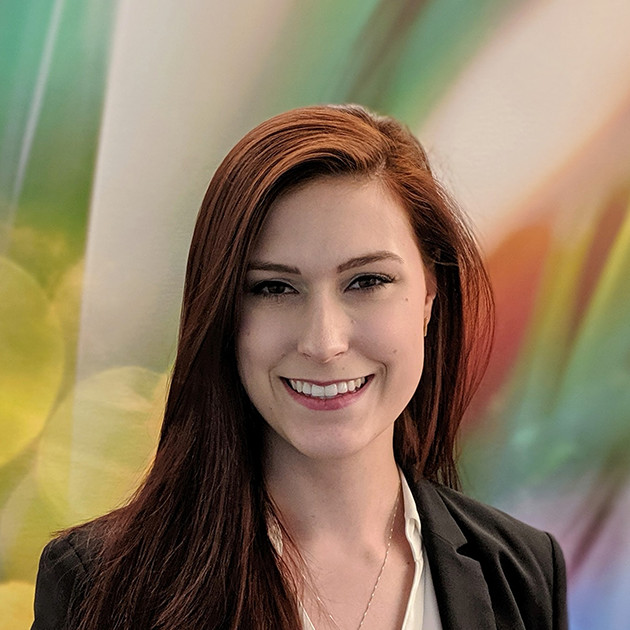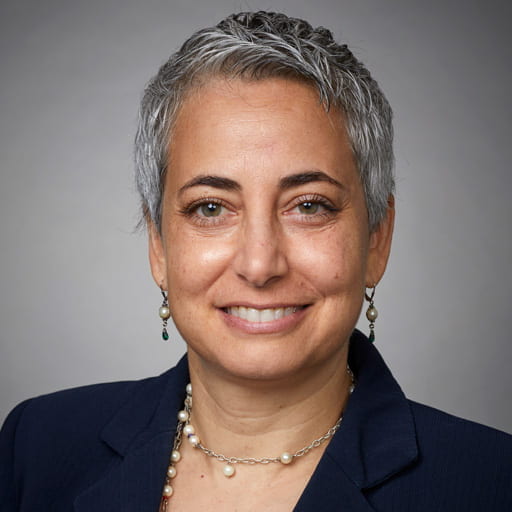
This episode features Anuja More, MBA’15, senior product manager for Juniper Networks’ Cloud Analytics and Operations division. Anuja joins host Dr. Monica Powell, senior associate dean and dean of graduate programs at the Naveen Jindal School of Management, to discuss her time in the Jindal School’s Full-Time MBA program and how those experiences and connections prepared her to make an impact in her career as a product-management professional.
Transcript
Introductory music plays up through Monica’s introduction.
[Jimmie] This is yet another MBA G.O.A.T. A podcast featuring conversations with the greatest of all-time MBA alumni from the Naveen Jindal School of Management at the University of Texas at Dallas. We are here to celebrate the outcomes of graduate management education and to identify remarkable examples of how the MBA program here at the Jindal School has transformed the lives of our alumni. Now, here’s Dr. Monica Powell, Senior Associate Dean and Graduate Dean at the Jindal School. Take it away, Monica.
[Monica] Well, hello there, I am Monica Powell. I am the Senior Associate Dean and Graduate Dean here at the Jindal School of Management at the University of Texas at Dallas. (The music has continued through this, diminishes and ends.) We are so excited to have Anuja More with us. Anuja is one of our exceptional MBA G.O.A.T.s, Greatest of all Time, graduated four years ago. Anuja is now working for a company called Juniper Networks, happens to be a company she happened to do an internship with while she was a student and Anjua, welcome to the podcast and man, I’ve got a straight of the gate question for you. So, you are one of those highly technical, analytical undergraduate students who decided to come to the Jindal School to get an MBA and got an MS at the same time. So, how in the market where you work now? How is that an advantage for you?
[Anuja] Well, it’s funny that you say it’s been a long time ‘cause I still feel it was like yesterday when I graduated. (Laughing) And, yah, I mean I just bumped into somebody whom I shared a course with especially in the master’s degree, recently and I just realized it’s been, it’s been four years. I mean four great years lots of, lots of learning, lots of things that I could take both from my MBA and as well as my masters degrees and applying it every day of my job. So, I think well there are kind of various reasons why one decides to pursue any higher educational degree, right. It’s either kind of like moving up in your, in your chosen field or changing paths completely. I had a very technical engineering background, ah, previous to pursuing MBA. So, I did my undergrad in computer engineering and had kind of worked for three years as a software developer and I was kind of in that stage of my career where I wanted to explore new ways of thinking or discovering how to make the contribution I always wanted to. And, that’s the reason why essentially I decided to pursue an, an MBA degree in the sense where it gave me an opportunity to reinvent my, my career focus. Like be at the intersection of technology with business as well as product innovation, and what I do day to day as a part of my job with Juniper Networks here is, is that I am a product manager for the telemetry and analytics portfolio of products. And, that essentially puts me at, um, the very intersection of ah technology, business, and product innovation and to be able to kind of, be at that, at that, um in the role where you need to have the core understanding of the technology as well as the concepts within, um analytics as well as being able to um drive business for the, the technology products wherein you’re not only just deciding what products should the company be developing, but at the same time how do you take some of those products to the market? How do you price them? How do you, uh, enable your sales organizations to be able to take those products to the market? So, I think the most value that I got out of the higher education, the, especially at UTD, where it gives you the, opportunity to pursue, uh, both the business and as well as the technological degree within the, the role period of, of, two years was highly valuable and all the concepts whether it’s both quantitative as well as soft skills really enabled me to position myself very well in the industry to do what I am able to do now.
[Monica] So, that’s a really interesting intersection to be working in. You know, product development, innovation, strategy, analytics, all kind of rolled up into what sounds like a really high-powered job. I’m, I’m curious, given that you are in San Francisco; are there a lot of people that are in roles like you that also have an MBA?
[Anuja] Well in, in product management, I would say that people from different backgrounds that could transition you from whatever role you are to being a product manager. So, some, most of the folks that I work with on my team are the product management team do have a management background, whether it’s in the bachelor’s or master’s degree format or they have experience leading products. They might have come from an entrepreneur background. Being in a technology company obviously most of the, most of my peers have a technology background or per se an engineering background. But, I would say that a, a master’s degree or an MBA definitely puts you the edge of, of um you know the business related a items that you have to work on and so I would say around a most of them, most of my peers do have a management degree, but not everybody. Like most of them would, would come from a background with some sort of where they have managed products or um some kind of ventures in their previous experience.
[Monica] You know, Anuja, that’s um, that’s really interesting. So, so I’m going to believe because you’re a product of our MBA program that you feel that having the MBA has given you a distinct advantage, um, you know, helping you to be on the edge of, of what you’re doing. You know, I, I was looking at your, your background and I was reminded that you actually did an internship at Juniper as a student. And then, you made a transition, I think, to Fujitsu before you then returned, ah, back to, um, to Juniper. So, I’m a little bit curious as to,um, how you made that transition and what brought you back to Juniper after, after an internship so many years earlier.
[Anuja] That’s a great question ‘cause I, I get a lot of that. Well, during my, my MBA, I did apply to a lot of, ah, internship positions and this particular position that I, um, did with Juniper Networks was in partially product management, but more on the product marketing side where I was supposed to devise plans to take some of Juniper’s, ah, products and devise, like go to market strategies around that being able to position the products, ah, effectively perform like sales enablement or develop tools for sales enablement. And, that kind of was my breakthrough into understanding product management and product marketing in a sense where I could really make an impact to the revenue for the company. When I started through the MBA journey at UT-Dallas, I, uh, although I had a few things in mind of what I want to pursue first MBA, but at the same time, I also was open minded. And, this is another, like, advice that I would like to, um, ah, kind of, um, give the prospective students or the audience who are listening to this podcast is have a focus, but at the same time be it keep an open mind. I, when I started with the MBA journey, I was kind of, ah, into a place when I was still trying to figure out what I would enjoy the most. I did think that management consulting was one, ah, area where I would really enjoy working with different companies. You get to work with different domains, ah, and apply some of your recommendations to really make an impact to the company.
[Monica] Wow, that’s that’s really great.
[Anuja] Thank you so much. Ah, there was one particular course during the MBA that really exposed me to the concepts of product management and product marketing. I think it was one of the, um, courses called technology and new product development, that really focused on, you know, managing, um, technology intensive products in industries and firms, and so product management was an area where the more I kind of got to know the, the concepts within product management, the more I was intrigued, and this internship gave me an opportunity to first-hand try, um, try some of that and apply the, the skills that I’ve learned from the course where I did really enjoy, but, I, I was more, um, curious to kind of further expand into the product management side of it, not so much on the just focus on the marketing. At Fujitsu, I was part of, I was hired as, as one of the MBA graduates, ah, so what, what Fujitsu essentially had was a rotational program where they would go across, um, across B schools across the U. S. and, you know, hand pick a few, ah, MBA grads that they would chose to put through a rotational program, and a that was a great opportunity because it was a product management rotational program that we would have, like, a six-month training. We went through a six-month training where, we kind of, they, they had us walk through operations. They had us walk through marketing. They had us work through finance. So we had kind of, we rotated through various business units within, ah, within Fujitsu and before we were allocated to a line of business. So, that kind of really you know had me apply all the skills that I had learned during the MBA and that my master’s degree to a real-world industry, and Fujitsu was like a great, um, ah experience through, through, the product management side of things. It so recently happened that, um, I um got approached by Juniper again because they were looking for a product manager to lead the analytics piece, and one of the newly acquired products that they had, and they approached me and I was very happy because I had enjoyed during the internship, because I had really enjoyed working with the folks here in terms of the culture that I enjoyed, and so I had the opportunity to move from Dallas to California, and I think I’ve, I’ve not looked back since then.
[Monica] Wow, that’s, that’s really a great story that talks (music begins) about the trajectory of the MBA experience and then out into how you leverage that into a place where you want to be in your career.
[Jimmie] This episode is brought to you by the UT-Dallas MBA program, top-ranked nationally and in Texas. The UT-Dallas MBA combines a robust core with 13 concentrations. You have an option to add a second Master’s degree and your choices for that include five STEM designated programs. The MBA program has fulltime, part-time, online and other formats. They give you flexibility to fit your MBA education into your busy schedule. The skills and training you will receive are what top employers are looking for. For more information, visit us online at jindal.utdallas.edu/mba
[Monica] You know you really are the amazing example that we really want our incoming students to have whether there, you were full time MBA student, but you know we also have flex-MBA with fully employed people. We have an online MBA. We have all of these variations (music stops) of doubles and duals and so, students can come in and so often, you know, they arrive at, at the first day of class and they’ve got this one idea of where they’re going to go and what they’re going to do. And we try to tell them you know, “Let the experience guide you.” And it sounds like from that product management class you had that journey you were open minded and you said, “I don’t want to specifically define what my destination is.” And then you let the experience help you find your destination. Do you happen to remember who the faculty member was that taught that product management class?
[Anuja] Oh, yes, it was ah Professor Rajiv Shah. I think, um he was one of the key professors who really kind of brought the real-world industry experience. I mean, we learned things like not just like focusing on key industry and technology trends, but how do you link technology with the business strategies? We would, in the course, where he really brought in real-world examples of analyzing actual situations in organizations and how do we kind of summarize the findings and recommendations in depth and so, um, I think, it really kind of helped me gain exposure into this space and then try to kind of see if, if, I love it and I seem to be happen to love it, and so that’s something that I really, ah, that I really appreciate of, um, the UTD MBA experiences is the flexibility and in course ware, and, I mean there are more than, I think, 15 concentrations and a bunch of additional courses that you can take not just from the business side of course, and but also from other IT and computers and if you want if you’re more interested in strategy. If you are more interested in entrepreneurship or marketing you can choose to design your, your, degree according to your domain and, ah, the interest that you develop throughout the ah, two years, so I think the course customization, the double-degree options that you have, I think more than hundreds of electives that you can choose from really helped me shape my degree to the way I want to do and customize it the way I wanted to.
[Monica] You know we are right in the process, Anuja, of recreating our MBA website, and I and I, really love that phrase that you know you come to UT- Dallas and you can really have a designed customized MBA experience depending upon your own portfolio where you want to go and then what excites you by the experience here and you were not just a great student and an individual who managed to capture two degrees in a short period of time and do it very well, but you are also highly engaged while you’re in the program. If I remember correctly, you won a couple of case competitions, I think, the AT&T big data companies.
[Anuja] AT&T
[Monica] So why don’t you tell us a little bit about, um, what that experience was like and really how it, it, either solidified or helped to change the trajectory of where you’re going or what you took away from that because we tell students all the time that it’s not just about the courses and the grades it’s about engaging and building a strong network so how did that out-of-class engagement help you?
[Anuja] I think that is a great question, Monica, because I really want to, um, anybody who is looking to kind of pursue an MBA, I really want them to understand how much you gain out of the entire experience outside of, um, you know text books or, or, or classes. I think ah, ah, the key, you know, there’s, there’s so much that you get to experiment with. I mean you obviously have your assignments and group projects and tests and so on and so forth, but outside of that, I think there is so much that you can participate in that really adds value to your overall experience. Speaking about case competitions, um, I think um, there is there are tons of opportunities during the entire span of two years of the MBA degree that you get, ah, to get an opportunity to actually work with a, a company, actually work with teams that are working on actionable projects within an organization. One such competition was the AT&T case competition that a few of the students within the cohort, we formed a team and we were competing against other teams that were working on a particular problem that AT&T was, ah looking to resolve. Ah, we essentially got a topic that we were supposed to analyze and present to the executives at AT&T to kind of take their overall 360 degree 5G vision to market, and we were supposed to develop a project plan and present it in front of the executives. I think beyond just the text books and the theory, I, I, think it’s about forming relationships. It’s about exchanging ideas. It’s about sharing your background and your culture. I think the biggest, ah you know, lesson that that you learn, um, is to be able to gain that, that confidence to, to make a decision with limited information. I think prior to business school, I had a lot of experience with analyzing situations or, you know, weighing the pros and cons and ultimately making decisions. However, such opportunities such as like case studies and working together as a team takes those skills to the next level. It kind of teaches you how to take all of the data available, make calculated assumptions, weigh the potential outcomes and consequences and then you know how do you pivot with the results and learn like, these decision-making skills. I think those, those are some of the key skills that you cannot get in a textbook setting in, in a, in a classroom setting. So, I think these kind of opportunities, the case studies, the, the case competitions was one part of it. But, throughout the MBA journey for two years, you get various opportunities to participate in live projects. I remember especially a, a course that we took under Professor Jeffrey Hicks. I think this was the, um, one of the courses that I took under him. I think it was the organizational behavior, if I’m not mistaken. But in that particular course, you get a chance to kind of work with, work with a team of students on a live customer problem that the company has. So, you actually get to spend time at the company. Every week we used to visit the company, meet with the, the team there and work together on, an end-to-end project. But, at the end of the semester, at the, at the end of the course, you would go and present this to the teams of the company as well as internally, and that’s how you would be graded. So, these kind of experiences really mold you and, um, that’s what the real value of, of the UTD MBA experience is.
[Monica] Wow that’s, that’s a terrific a, a terrific story in, Anuja. Thank you for sharing that with us. You know, we tell graduate students coming into the program all the time that this is one of their last opportunities to make a set of lifetime friends. I’m curious, you know, you are four years out now, how often do you connect with all of those students that you, ah, it was blood, sweat and tears for two years and you know, a lot of stress a lot of, a lot of tough assignments/projects, but how much do you stay in touch with your friends?
[Anuja] Well, I think, ah, I would like to stay in touch more so more than, than, what I am now. I think during a key value that I could derive from the UTD MBA experience is that I was able to build a, a very powerful network of accomplished and inspiring colleagues. And, they will then continue to sustain me even long after, you know, after graduation. So, I remember our batch was of some 55 students and many of which came from various professional and personal backgrounds. So, we had a few doctors, a few military veterans, accountants and engineers. And, from working with many of these people during, like, group exercises, we did have like a lot of, like, type A characteristic people, but then you kind of realize to how to work in a team effort of realized that we bring unique perspectives to the shared learning, um, objectives and, and it made the entire, like, every group experience sort of, like, exhilarating. So, like kind of emphasizing on, on what we were talking earlier. MBA is not just about, like, taking classes and doing case studies. It’s about forming relationships and exchanging those ideas. I’m in touch with a lot of, um, people, ah, from our batch, ah mostly on social media, but I think since everybody’s moved across, throughout, across the United States, some have moved even moved back, but we still are in touch with each other. In fact, we have a group of UT-Dallas, ah, Bay Area students, and I think that’s a great alumni group. We also have a female organization, ah, like, ah, an informal organization that we have here of UTD alumni female students and we decide to do meet-ups. So, not very often since everybody’s, like, busy and they are in their work, but we at least kind of plan to meet once every month here in, in California in Bay Area and kind of just discuss on career opportunities where each one of us are in their life stages. We also discussed some personal stuff. So yes, I think the powerful network that that is built is, is definitely kind of helping. It’s inspiring and we continue to, to sustain that, try to meet more, more often than we, then we are able to, but I think with social media it should not restrict you from staying connected, ah, no matter where you are in the world.
[Monica] That’s absolutely true for your generation. My generation needs to get a little better at that, Anuja. Um, (Anuja laughs) I want, to ask you ah, ah, challenging question because it’s a question that those of us who, who manage, direct and create strategy for graduate management education, it’s a question that people are asking themselves all across the country and really throughout the world, because I’m sure you’ve seen the Wall Street Journal. You’ve seen Forbes. You’ve seen Poets and Quants’ website that, ah, showcases MBA programs. That really the MBA degree itself is a bit on, you know, it’s under, ah, skeptic demise in the sense that is there really a place for the MBA in today’s market place? What do you think about that? Do you think that it’s still relevant? Do you think t still matters?
[Anuja] You know, I think I’ve read so many articles about whether or not MBA is, is worth it. And, I think it’s a fair question to ask, especially if you see the amount of investment that you need to do, not just on a personal, but also in a monetary, ah, on the monetary aspects of things. It’s an investment. It’s definitely, you’re putting in, ah, if in, in case you’re doing a fulltime MBA, you’re putting in two years of, of your life into a, into a degree also its an MBA. Getting an MBA in the United States is, is expensive, as well. So, I think it’s a fair question whether or not, it’s, um, it’s, you know, worth pursuing. The real value of, of, it is in a way that it’s, it’s an investment that you make in your own future and I think that definitely is, is worth it. I mean it grills you just the, the two years, I think I would say I, I struggled a bit, but it did pay off. I mean it, you doing like it was like doing a 16-month crash course in business world and concepts that I would, ah, later apply first hand every day at my job, you know post-MBA. So, it, it teaches you much more than you think, you, you will, um, dealing with difficult people, structuring big projects, I mean, managing expectations, learning how to communicate with different pieces of an organization. The MBA experience kind of braces you for everything that the, the countless kind of, ah, things that you would actually have to face in a real world scenario. So, I think it’s definitely um an investment and it definitely will pay off, um, throughout your life.
[Monica] Well, Anuja, I, I would absolutely say that you are, um, an individual whom we are extraordinarily proud of. As I tell all alumni when they get ready to graduate, we’re going to take full credit for all of your accomplishments for the rest of your life. (Anuja laughs) And in the four short years that you’ve been out, you have done amazing things; and I think you’re a great spokesperson for why getting an MBA still matters in a very complicated world. And, we are thrilled that you would take time away from your product manager role there at Juniper to talk with us today and to share with those that will listen to this podcast about why all of this matters and why the return on investment, ah, can impact you the rest of, of your life. So thank you for being with us today, Anuja. We hope that you’ll stay in touch with us for a long, long time and come back (music begins) and visit the MBA program and cheer on those that come behind you.
[Anuja] Thank you, Monica. Thank you so much for giving me an opportunity to share this amazing experience that I had. Ah, I think those were the, the two best years of my life. That if, I had to relive it again, um, I would definitely, ah, go back to the time that I spent at UT-Dallas. Thank you so much.
[Monica] Thank you so much for listening to today’s podcast. I hope that you were inspired by the words you heard from one of our Greatest Of all Times MBA G.O.A.T.s . If you were inspired to think about getting an MBA degree, I hope that you will be in touch with us. Give us a call, drop us an e-mail, hop on our website. Be in touch with us so that we can help you make a difference in your future. We look forward to hearing from you.
[Jimmie] Thanks for listening to this episode of yet another MBA G.O.A.T. podcast. Join us online at mbagoat.com to find episode notes, links and more. Be sure to subscribe to yet another MBA G.O.A.T. podcast on Apple podcast or your favorite podcasting app. If you like what you hear, please leave us a five-star review. That will help spread the word about the podcast and Jindal School’s MBA programs. To learn more about the Jindal School’s MBA programs, go to jindal.utdallas.edu/mba. (Music continues.)





